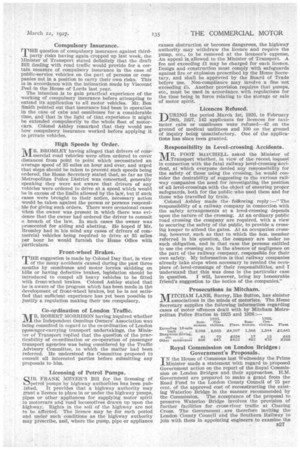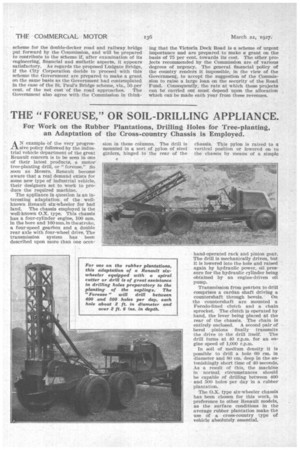ROAD TRANSPORT MATTERS IN PARLIAMENT.
Page 52

Page 53

Page 54

If you've noticed an error in this article please click here to report it so we can fix it.
Labour Member and the Commercial Vehicle Driver. Taxation of Municipal Vehicles. Licensing of Petrol Pumps. Driving Licences (Public-service Vehicles) Refused.
By Our Special Parliamentary Correspondent.
THERE is a curious mentality which persists in the belief that street accidents are mainly due to commercial vehicles. An instance of this wa,s provided the other day, when a Labour member, Mr. Walter Baker, declared that trade and commercial motor vehicles in London had killed 104 persons and been involved in 6,058 accidents to persons and property within the Metropolis during the last quarter of 1926. Colonel Ashley very properly pointed out that accidents, both fatal and non-fatal, caused by vehicles in the Metropolis were not by any means confined to trade and commercial vehicles ; 189 persons had been killed and 25,000 accidents had been occasioned to persons and property by other classes, of vehicle in the period mentioned. The problem of these accidents, he added, must be dealt with as a whole, and he reminded the House that he expected a report in a few days from the Traffic Advisory Committee on the prevention of street accidents, and that he had convened a conference of local authorities and other bodies concerned for the 21st inst. (yesterday).
The Home Secretary, on being asked to state how many drivers of ommercial road vehicles were prosecuted for excessive speed or dangerous driving during B26 the past 14 months, and how many were involved in fatal accidents, replied that the returns of prosecutions and of accidents furnished to his department, for statistical purposes, did not distinguish those concerning drivers of commercial vehicles.
Taxation of Municipal Vehicles.
MR. THOMAS WILLIAMS sought information as to the number of motor vehicles owned by local authorities and used in non-trading services such as sanitary work and road cleansing, and the amount paid in taxation in respect of those vehicles. Colonel Ashley replied that the records of licensing authorities were maintained in such a form that the information could only be extracted by long and laborious search, and he hoped such a return would not be pressed for. Mr. Williams remarked that the increase of taxation on those vehicles which operated only within the district where they were owned was a considerable item of expenditure, and he asked whether representations had not been made to the Ministry. -Colonel Ashley observed that the subject was fully discussed on the Budget last year, and no doubt it would come up again on this year's Budget.
Compulsory Insurance.
T"question of compulsory insurance against thirdparty risks having again cropped up last week, the Minister of Transport stated definitely that the draft Bill dealing with road traffic would provide for a certain measure of compulsory insurance in the case of public-service vehicles on the part of persons or companies not in a position to carry their own risks." This is in accordance with the intimation made by Viscount Peel in the House of Lords last year.
The intention is to gain practical experience of the working of compulsory insurance before attempting to extend its application to all motor vehicles. Mr. Ben Smith pointed out that insurance had been in operation in the case of cabs and omnibuses for a considerable time, and that in the light of that experience it might be extended compulsorily to. the whole fleet of motorcars. Colonel Ashley remarked that they would see how compulsory insurance worked before applying it to private vehicles.
High Speeds by Order.
MR. BROMLEY having alleged that drivers of eam. mercial road vehicles were often ordered to cover distances from point to point which necessitated an average speed of 35 miles an hour and over, and urged that steps should be taken to prevent such speeds being orderer], the Home Secretary stated that, so far as the Metropolitan Police District was concerned, generally speaking they were not aware that drivers of any vehicles were ordered to drive at a speed which would be in excess of the limits allowed by the law, but if such eases were brought to their notice, necessary action would be taken against the person or persons responsible for giving such orders. There were occasional cases when the owner was present in which there was evidence that the owner had ordered the driver to commit a breach of the law. In such cases the owner was prosecuted for aiding and abetting. He hoped if Mr. Bromley had in his mind any cases of drivers of commercial vehicles being required to drive at 35 miles per hour he would furnish the Home Office with Particulars.
Front-wheel Brakes. THE suggestion is made by Colonel Day that, in view of the many accidents caused during the past three months by omnibuses and motor lorries skidding on hills or having defective brakes, legislation should be introduced to compel all heavy vehicles to be fitted with front-wheel brakes. Colonel Ashley stated that he is aware of the progress which has been made in tha development of front-wheel brakes, but he is not satisfied that sufficient experience has yet been possible to justify a regulation making their use compulsory.
Co-ordination of London Traffic.
MR. ROBERT MORRISON having inquired whether the Independent Omnibus Owners' Association was being consulted in regard to the co-ordination of London pgssenger-carrying transport undertakings, the Minister of Transport replied that the question of the practicability of co-ordination or co-operation of passenger transport agencies was being considered by the Traffic Advisory Committee, to which the matter bad been referred. He understood the Committee proposed to consult all interested parties before submitting any proposals to him.
Licensing of Petrol Pumps,
QM FRANK MEYER'S Bill for the licensing of 1,..../petrol pumps by highway authorities has been pub
Ished. It provides that a highway authority may grant a licence to place in or under the highway pumps, pipes or other appliances for supplying motor spirit to motorcars and road locomotives drawn up upon the highway. Rights in the soil of the highway are not to be affected. The licence may be for such period and under such conditions as the highway authority may prescribe, and, where the pump, pipe or appliance
causes obstruction or becomes dangerous, the highway authority may withdraw the licence and require the Pump, etc., to be removed at the licensee's expense. An appeal in allowed to the Minister of Transport. A fee not exceeding £1 may be charged for each licence. Design and construction must comply with safeguards against fire or explosion prescribed by the Home Secretary, and shall be approved by the Board of Trade before use. Non-compliance may involve a fine not exceeding £5. Another provision requires that pumps, etc, must be used in accordance with regulations for the time being in force relating to the storage or sale of motor spirit.
Licences Refused.
DInuNd the period March 1st, 192e, to February 28th, 1927, 142 applicants for licences for taximeter cabs or omnibuses were refused-42 on the ground of medical unfitness and 100 on the ground of inquiry being unsatisfactory. One of the applications has since been granted.
Responsibility in Level-crossing Accidents.
mR. FOOT MITCHELL asked the Minister of Transport whether, in view of the receni inquest in connection with the fatal railway level-crossing accident, at which everyone denied any responsibility, for the safety of those using the crossing, he would consider the desirability of suggesting to the various railway companies the need for investigating the position of all level-crossings, with tile object of ensuring proper safeguards, both for the public who used them and for those who travelled by train.
Colonel Ashley made the , following reply :—" The responsibility of a railway company in connection with the safety arrangements at a level-crossing depends upon the nature of the crossing. At an ordinary public road crossing the company are required, with a view to securing the safety of the public, to provide a crossing keeper to attend the gates. At an occupation crossing, however, such as that to which the hon. member referred in his question, the company are under no such obligation, and in that case the persons entitled to use the crossing are, in the absence of negligence on the part of the railway company, responsible for their own safety. My information is that railway companies already take steps when necessary to remind the occupiers of level-crossings of their responsibilities, and I understand that this was done to the particular case in question. I will, however, bring my honourable friend's suggestion to the notice of the companies."
Prosecutions in Mitcham. '
MITCHA LANE, Surrey, like Sutton, has sinister NI associations in the minds of motorists. The Home Secretary supplies the following information regarding cases of motor offences dealt with by Mitcham Metro politan Police Station in 1025 and 1926 :-1 1925. 926.
Royal Commission on London Bridges: Government's Proposals.
IN the House of Commons last Wednesday the Prime Minister made a statement with regard to proposed Government action on the report of the Royal Commission on London Bridges and their approaches. II.M. Government are prepared to make a grant from the Road Fund to the London County Council of 75 per cent. of the approved cost of reconstructing the existing Waterloo Bridge in the manner recommended by the Commission. The acceptance of the proposal to preserve Waterloo Bridge involves the provision of further facilities for cross-river traffic at Charing Cross. The Government r are therefore inviting the London County Council and the Southern Railway to join with them in appointing engineers to examine the
scheme for the double-decker road and railway bridge put forward by the Commission, and will be prepared to contribute to the scheme if, after examination of its engineering, financial and sthetic aspects, it appears satisfactory. As regards the proposed Ludgate Bridge, if the City Corporation decide to proceed with this scheme the Government are prepared to make a grant on the same basis as the Government had contemplated in the case of the St. Paul's Bridge scheme, viz., 50 per cent. of the net cost of the road approaches. The Government also agree with the Commission in think ing that the Victoria Dock Road is a scheme of urgent importance and are prepared to make a grant on the basis of 75 per cent, towards its cost. The other projects recommended by the Commission are of various degrees of urgency. The general financial policy of the country renders it impossible, in the view of the Governmen±, to accept the suggestion of the Commission to raise a large loan on the security of the Road Fund. Consequently, the rate at which these projects can be carried out must depend upon the allocation Which can be made each year from these revenues.




















































































































